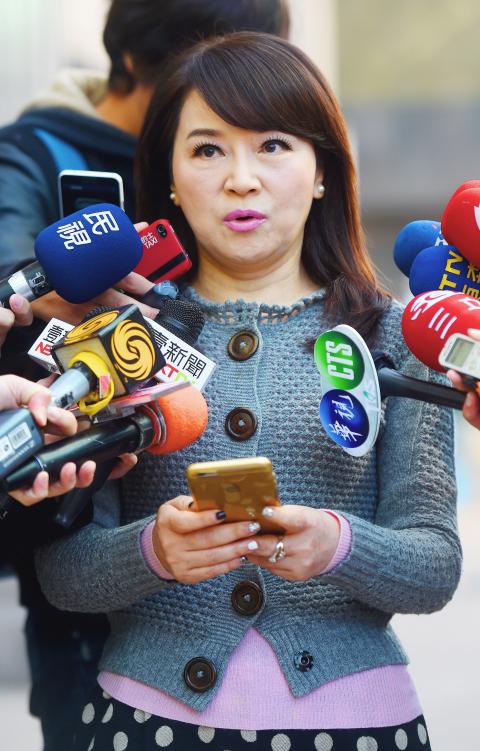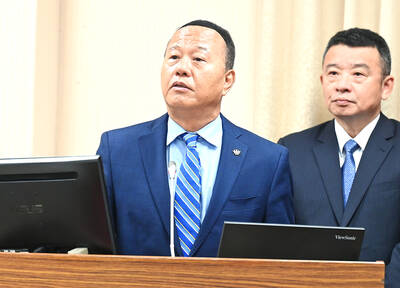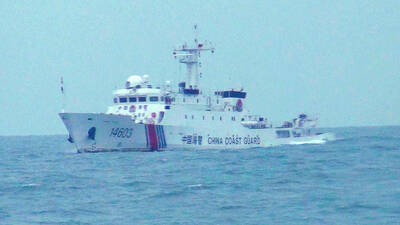The Chinese Nationalist Party (KMT) yesterday denied media personality Clara Chou (周玉蔻) a chance to present herself at the party’s Central Standing Committee meeting to appeal against her expulsion from the party.
The Evaluation and Discipline Committee of the party’s Taipei chapter on Tuesday decided to expel Chou from the party, with chapter director Chung Tse-liang (鍾則良) saying that remarks made by Chou during the campaigns leading up to the nine-in-one election on Nov. 29 had damaged the party’s reputation.
Chou has alleged that President Ma Ying-jeou (馬英九) accepted an off-the-books political donation of NT$200 million (US$6.29 million) from Ting Hsin International Group (頂新國際集團) during his re-election campaign in 2012.

Photo: Chien Jung-fong, Taipei Times
Ma has denied the allegation and filed criminal and civil suits against Chou on Tuesday.
Earlier yesterday, Chou said she was like a person drowning after being put into a bag and thrown into the sea.
“I had no chance to fight back,” she said.
Chou was among 21 KMT members who were stripped of party membership on Tuesday for what the party said were violations of various party rules during the campaign.
Asked to respond to Chou’s comments, KMT spokesperson Charles Chen (陳以信) said anyone who was not happy with the decision made by the party’s Evaluation and Discipline Committee could appeal against the ruling in accordance with established procedures.
Meanwhile, former Presidential Office deputy secretary-general Lo Chih-chiang (羅智強) yesterday posted an article on Facebook rebutting Chou’s allegation that he had tried to intervene in the battle for ownership of Chang Hwa Bank (彰化銀行) between Taishin Financial Holdings (台新金控) and the Ministry of Finance in Taishin’s favor because he had dined with Chang Hwa Bank chairman Thomas Wu (吳東亮) last year.
Lo said the meeting was arranged by Chou and accused her of setting him up.

VIGILANCE: The military is paying close attention to actions that might damage peace and stability in the region, the deputy minister of national defense said The People’s Republic of China (PRC) might consider initiating a hack on Taiwanese networks on May 20, the day of the inauguration ceremony of president-elect William Lai (賴清德), sources familiar with cross-strait issues said. While US Secretary of State Anthony Blinken’s statement of the US expectation “that all sides will conduct themselves with restraint and prudence in the period ahead” would prevent military actions by China, Beijing could still try to sabotage Taiwan’s inauguration ceremony, the source said. China might gain access to the video screens outside of the Presidential Office Building and display embarrassing messages from Beijing, such as congratulating Lai

Four China Coast Guard ships briefly sailed through prohibited waters near Kinmen County, Taipei said, urging Beijing to stop actions that endanger navigation safety. The Chinese ships entered waters south of Kinmen, 5km from the Chinese city of Xiamen, at about 3:30pm on Monday, the Coast Guard Administration said in a statement later the same day. The ships “sailed out of our prohibited and restricted waters” about an hour later, the agency said, urging Beijing to immediately stop “behavior that endangers navigation safety.” Ministry of National Defense spokesman Sun Li-fang (孫立方) yesterday told reporters that Taiwan would boost support to the Coast Guard

GLOBAL: The slogan would be advertised in popular tourist destinations in North America and Europe, such as Champs-Elysees and Times Square, the agency said “Taiwan: Waves of Wonder” is to be the country’s new tourism slogan for the next 10 years, the Tourism Administration said yesterday, adding that it would be showcased in commercials at the Olympic Games in Paris and other major cities and travel fairs around the world. The new slogan, logo and theme song, which were unveiled at a news conference in Taipei, marked the agency’s latest effort to attract 10 million international visitors to Taiwan this year, a goal that it readjusted earlier this year, as China has yet to lift its travel ban to Taiwan. The administration created the “Taiwan: Touch

BOOST TO SPORTS? The Executive Yuan said that the amendment was introduced to attract professionals to Taiwan, and increase the incentives for naturalization The Legislative Yuan yesterday passed on third reading an amendment to the Nationality Act (國籍法) that would reduce the minimum residency period required for highly skilled professionals to apply for naturalization from three to two continuous years, with a minimum of 183 days in Taiwan each year. The 183-day requirement does not apply if an eligible applicant has lived legally in the territory of the Republic of China for more than five continuous years. Taiwan’s professional basketball leagues are expected to benefit from the amendments, which would allow them to recruit more players from overseas. Prior to the passage of the amendment, the